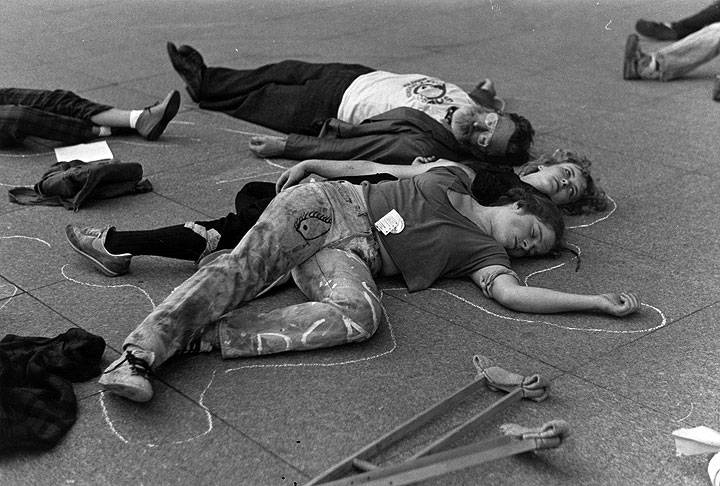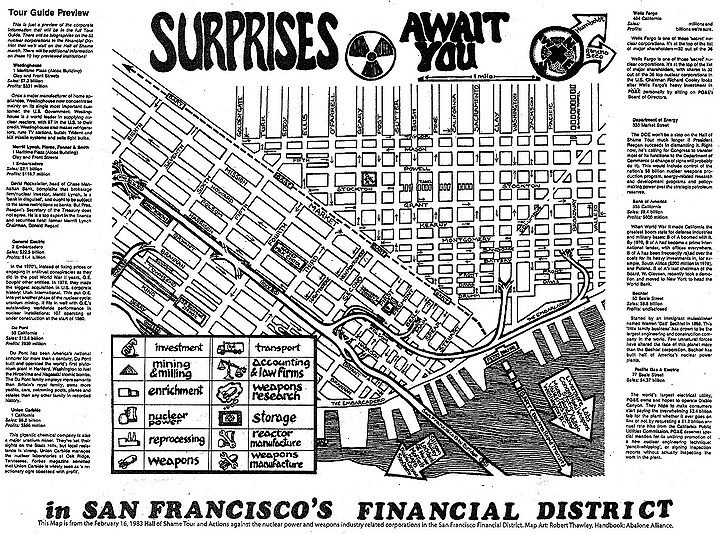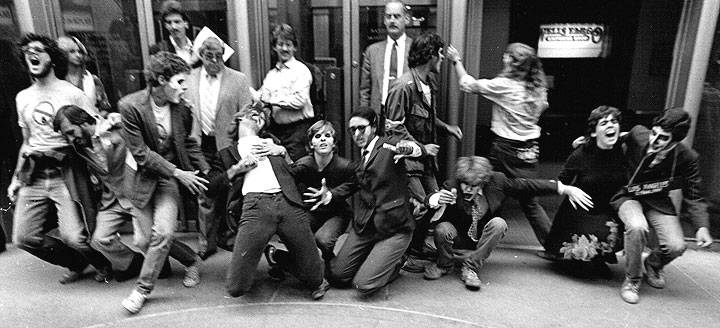Bringing the War to Downtown San Francisco 1983
"I was there..."
by Rachel Johnson
originally published in It's About Times, the Abalone Alliance newspaper, December–January 1984, under the title "Actions in San Francisco's financial district: Bringing the war home"
Die-in, downtown San Francisco, 1983.
Photo: Steve Stallone
On the morning of October 24, 1983 a funky old television set appeared atop a newsstand in the San Francisco financial district. Painted on the screen was a mushroom cloud and the message: WORLD WAR III WILL NOT BE TELEVISED. That TV and others which popped up in prime downtown spots were the first hints of things to come.
Beginning in the pre-dawn hours, independent groups of antinuclear activists began actions focused against the deployment of Cruise and Pershing missiles in Europe and San Francisco's corporate connection to the nuclear arms industry. Many workers were leafleted on their way to work, and others arrived to find their company buildings spray-painted with pointed graffiti such as NUCLEAR WEAPONS CONTRACTOR. By the end of the afternoon, there were probably very few downtown workers who hadn't felt the presence of the demonstrators in one way or another.
A map and guide to the Hall of Shame Tour, 1983.
Late in the morning, hundreds of people gathered at the foot of Market Street to begin guided tours of San Francisco's “Hall of Shame,” complete with presentations in front of the offices of corporations in the nuclear weapons business. At General Electric, the Commie Dupes affinity group set up a table which passed out information on the deadly GE products you don't see advertised on TV, along with “Cruise-baguettes” bearing the company slogan “We bring good things to life.”
During noon-hour traffic, activists from the affinity groups Change and the Gruesome Rebels (a.k.a. “Domestic Terrorists,”) along with a number of independents, tied traffic up in knots by staging die-ins in a series of crucial intersections. As police arrived at each location and asked them to leave, they did – avoiding arrest – and promptly repeated their action in another spot.
In addition to visiting their “favorite” corporations, many other groups paid calls on the Federal Building, the German Consulate, and other governmental offices. Their tactics of protest included blockades, door-chaining, street theater, and die-ins. By the end of the day, 72 people had been arrested.
The October 24 protests shook up the streets of the financial district and excited and energized many of their participants. The spontaneous and autonomous quality of the actions, the general focus on education and disruption rather than on getting arrested, and the use of die-ins as opposed to more traditional blockade techniques tactics all seemed to inspire activists to more of the same.
Die-In at anti-Cruise Missile demonstration, downtown San Francisco, 1983.
Photo: Keith Holmes
On December 2, 1983 a spontaneous die-in tied up traffic in the financial district again. Supporters leafleted the stalled cars with information about Cruise missile testing. Traffic was halted for 15 minutes, and there were no arrests since police couldn't get to the demonstrators through the traffic jam which the protest created.
The die-in-the-streets tactic has been used effectively in European demonstrations with thousands of participants. Hopefully, its use – and that of other creative tactics – will continue here on a larger and larger scale.



